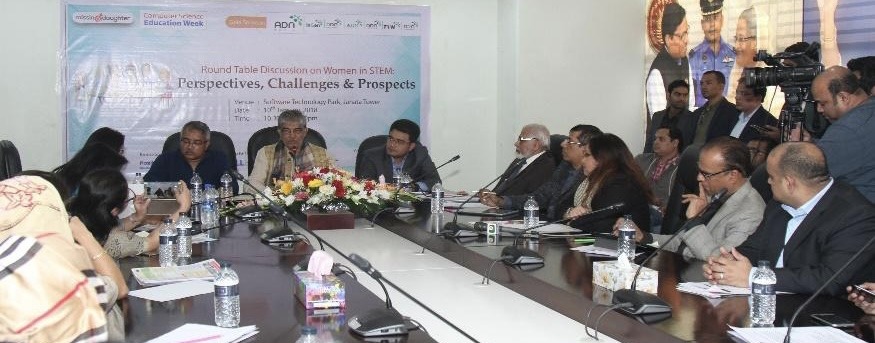
Story Behind Obak Kutuhole
To meet the increasing demand for a workforce with up-to-date, and competencies aligned with globally competitive industries, Bangladesh has to embrace Information and Communication Technology from its seed level education system. In this Backdrop, Mike Kazi, Founder of an Information Technology Enable Service providing company in Bangladesh named Kazi IT Center Ltd., proposed an initiative at a national level round table discussion on increasing the number of girls in science, technology, engineering, and mathematics in Bangladesh on 10th January 2018. This initiative allows rural girl students to have easy access to the ICT sector of Bangladesh. Telecommunications and Information Technology Minister Mustafa Jabbar was present as the chief guest in the discussion, organized by Bangladesh Open Source Network (BDOSN) at Janata Tower Software Technology Park in Kawran Bazar.
 fig.01 Round table discussion on increasing the number of girls in science, technology, engineering, and mathematics in Bangladesh
fig.01 Round table discussion on increasing the number of girls in science, technology, engineering, and mathematics in Bangladesh
After that discussion, in a collaboration with Kazi IT Center limited. BdOSN executed the proposed initiative in February 2019. With the participation of 73 girls from two rural schools, BdOSN kicked off this initiative titled 'OBAK KUTUHOLE'. And In the second phase, this initiative included 38 more female students.
Purpose and Key Objectives
The idea behind this program is to make rural girls desirous of science and technology through an enjoyable and joyful journey. BdOSN is aimed at bringing female students from the primary level of our rural schools under the focusing area of our ICT sector, inspiring them in ICT education and encouraging them to take ICT as a career as village girls are most deprived in terms of using information technology tool. Key objectives are:
- To create interest in information technology among the rural girls by bringing them to the capital city Dhaka, and taking them to the ICT-based companies, architecture, and historical places.
- To make our girls desirable in taking ICT as a career.
- To develop a bridge between the rural girls and the ICT education system to have access to ICT tools and resources.
Overview of the Program
In Bangladesh, most of the rural female students are disadvantaged in the technology sector compared to the urban students. Bearing that in mind, Bangladesh Open Source Network (BdOSN) organized “Obak Kutuhole” under its Missing Daughter program. In the year 2019, Obak Kutuhole was organized in two phases.
Through this event, rural girl students are introduced to various organizations and companies working in science and information technology, including various historical places in Dhaka. A total of 111 students from 4 remote areas of Bangladesh visited the capital city in two stages. A total of 73 students from two schools in Pabna and Shariatpur participated in the first phase- Vangura Jarina Rahim Girls’ High School, Pabna, and Shahid Buddhijibi Dr. Humayun Kabir High School, Shariyatpur came to this program on 22nd and 23rd February 2019.
The second phase of this event was organized with 38 students from 5 schools in Rangpur and Mymensingh on the 5th and 6th April 2019 – Schools were Pakuria Sharif High School, Haragach Bohumukhi High School, Sarai Munsipara High School, and Morneya High School from Rangpur and Choronikhola High School, Issorganj from Mymensing.
Program Outline
Obak Kutuhole is a two-day long program where students from the rural areas came to a residential dormitory in Dhaka and visited various places which stand as the symbol of the science and the nation, e.g- National Museum of Science and Technology, Jatiya Sangsad Bhaban, Dhaka University Area, Central Shaheed Miner Bangladesh, Bangabandhu Sheikh Mujibur Rahman, Novo Theater, Krishibid Institution, DBC News, Nagorik Television Center, Grameenphone, Genex Infosys limited and KAZI IT center.
On the evening of the first day, girls are clustered in a room. Some renowned people come to meet them which is the most amazing part of this program. Muhammed Zafar Iqbal, former faculty member of Computer Science and Engineering department at Shahjalal University of Science and Technology (SUST), Nova Ahmed, Professor of North South University, Kaniz Fatema, Former General Manager of Robi and Achia Nila, entrepreneur of Women in Digital and so many came to meet them. Students from the first phase got the opportunity to meet the team “SUST-Olik” who have won Nasa’s 2018 International Space Apps Challenge. On the evening of the second day, they leave the city full of encouragement and dream to be a tech professional in the future by embracing their technological skills and knowledge.
Key Achievements and Impacts
Even after these two-day-long visits, they remain attached to the follow-up part of the program. In addition, Kazi IT Center arranged a long-term intensive monitoring period of 6 months to 1 year so that all these rural girls do not drop out.
As the part of the follow-up session participants of two episodes of Obak Kutuhole:
- Participated in Sixth Children Science Congress, 2019
- Organized a weeklong festival titled “Technology Week” at Bangura Jarina Rahim Girls’ High School
- Organized Girls Programming Camp and Contest in 2019 at Bhangura Jarina Rahim Girls’ High School
- Participated in Bangladesh Robot Olympiad 2021
- Participated in International Robot Olympiad 2021
Achievements:
- A participant from the first episode of Obak Kutuhole, Sadia Anzum Pushpo a student of Bhangura Jarina Rahim Girls’ High School, won the Honorable Mention Prize in the Bangladesh Robot Olympiad. She participated in Robot Gathering Move in that national level Olympiad
- Sadia Anzum Pushpo also won the technical prize at the International Robot Olympiad 2021
- A total of 5 teams from Obak Kutuhole program participated in the 6th Children Science Congress in 2019 and 3 teams of them won the congress.
Way Forward
After the grand success of these two episodes of Obak Kutuhole, we need to focus on:
- Connecting more rural village schools to have easy access to ICT
- Need policy-level intervention to conduct this initiative in a large range
- Incorporate more tech organizations and companies to nurture the ICT learning system in rural areas
- Create more opportunities to learn, sharpen and flourish their skills and knowledge.
A Glimpse of the Events












